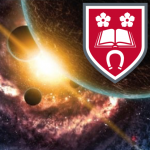
Ground-breaking view of the cosmos revealed at Space Park Leicester
Astounding images telling the story of a hidden universe through every phase of its cosmic history have been revealed for the first time at Space Park Leicester. The pioneering Midlands facility was one of only a handful of venues chosen by the European Space Agency to showcase the first images from the £10 billion James […]

First Images from James Webb Space Telescope
The first full-colour images from NASA’s largest and most powerful space science telescope will be revealed to the public at an exciting free event at Space Park Leicester. The pioneering Midlands facility has been successful in its bid to the European Space Agency to showcase the first images from the £10 billion James Webb Space […]

Gaia Data Release 3: New space data serves as ‘complete step change’ in understanding of our Universe
Space scientists have today (Monday) announced the discovery of a ‘super Jupiter’ orbiting a white dwarf, the first detected using direct observations with the European Space Agency (ESA)’s Gaia mission. The discovery forms part of a treasure trove of data made available in Gaia’s Data Release 3, which provides the most detailed survey of our […]
Casual astrophysics seminars next week – 28th June 2pm – 30th June 1pm – LTD
There will be two lunchtime seminars from visitors during the last week of June. 1) Rachael Amaro (University of Arizona) on “Clouds and Circulation in the Irradiated Brown Dwarf NLTT5306B”. Please contact Sarah Casewell for information. LTD at 2pm on Tuesday 28th June. 2) Jess Speedie (Victoria) on “Velocity Kinks: Reliable Signposts of Planets in […]
Astrophysics Seminar – Wed 22nd June 3pm – Vincent van Eylen
This week’s online-only Astrophysics Seminar at 3pm on Wednesday is the last scheduled for the 2021-22 season. Vincent van Eylen (UCL) will tell us about “The architecture of planets and their host stars” Abstract: Thousands of exoplanets have now been detected and they exhibit a striking diversity in properties, with system architectures sometimes similar but […]

New Results in X-Ray Astronomy: Looking ahead to Athena
During May 2022, the School of Physics & Astronomy hosted two back-to-back meetings in high-energy astrophysics. Both meetings were entirely face-to-face; for many of us, this was our first opportunity to meet with colleagues outside of our own University since lockdown in 2020. On Thursday, May 26th, we ran the “New Results in X-ray Astronomy” […]
Astrophysics Seminar – Wednesday June 15th 3pm – Can Cui on “Turbulence in outer protoplanetary disks”
This week’s astrophysics seminar is by Can Cui (Cambridge). Online, and projected in LTA, Online access in Teams at the address below. Abstract: Turbulence is essential to many fundamental processes in protoplanetary disks, including angular momentum transport, dust evolution, and planet migration. I will focus on two instabilities that can drive turbulent motions in outer […]
Astrophysics Seminar 8th June 3pm on Teams – Laura Rogers on White Dwarf planetary systems.
Laura Rogers (Cambridge) will present remotely via Teams, and be projected in LTA. Title and abstract: An observational perspective on white dwarf planetary systems Around a third of white dwarfs are externally polluted by planetary material. It is hypothesised that chunks of planetary material get perturbed onto star grazing orbits, tidally disrupt, and accrete onto […]
Astrophysics Seminars – today and for the rest of the month.
Today’s speaker is our own Beatriz Sanchez-Cano, talking about “Martian Space Weather” live at 3pm in LTA, and the talk should also be streamed on Teams. Teams link for today’s talk: https://teams.microsoft.com/l/meetup-join/19%3ameeting_ZDQxN2IzNzQtZDRjNC00YjUyLTk2NmUtYWRhZGEyMzcxMjI0%40thread.v2/0?context=%7b%22Tid%22%3a%22aebecd6a-31d4-4b01-95ce-8274afe853d9%22%2c%22Oid%22%3a%2218245205-3fea-4456-a63f-afae0cafeaf7%22%7d For the rest of term (and slightly beyond) the following schedule is planned: 8th June – Laura Rogers “An observational perspective on white […]

James Webb Space Telescope’s coolest instrument captures Large Magellanic Cloud
The UK’s main contribution to the James Webb Space Telescope (JWST), the Mid-Infrared Instrument (MIRI), has now opened its eye to the sky. And Leicester scientists and engineers – many of whom involved with the most complex space observatory ever built from the very start – have reacted to the first MIRI images released by […]

Recent Comments